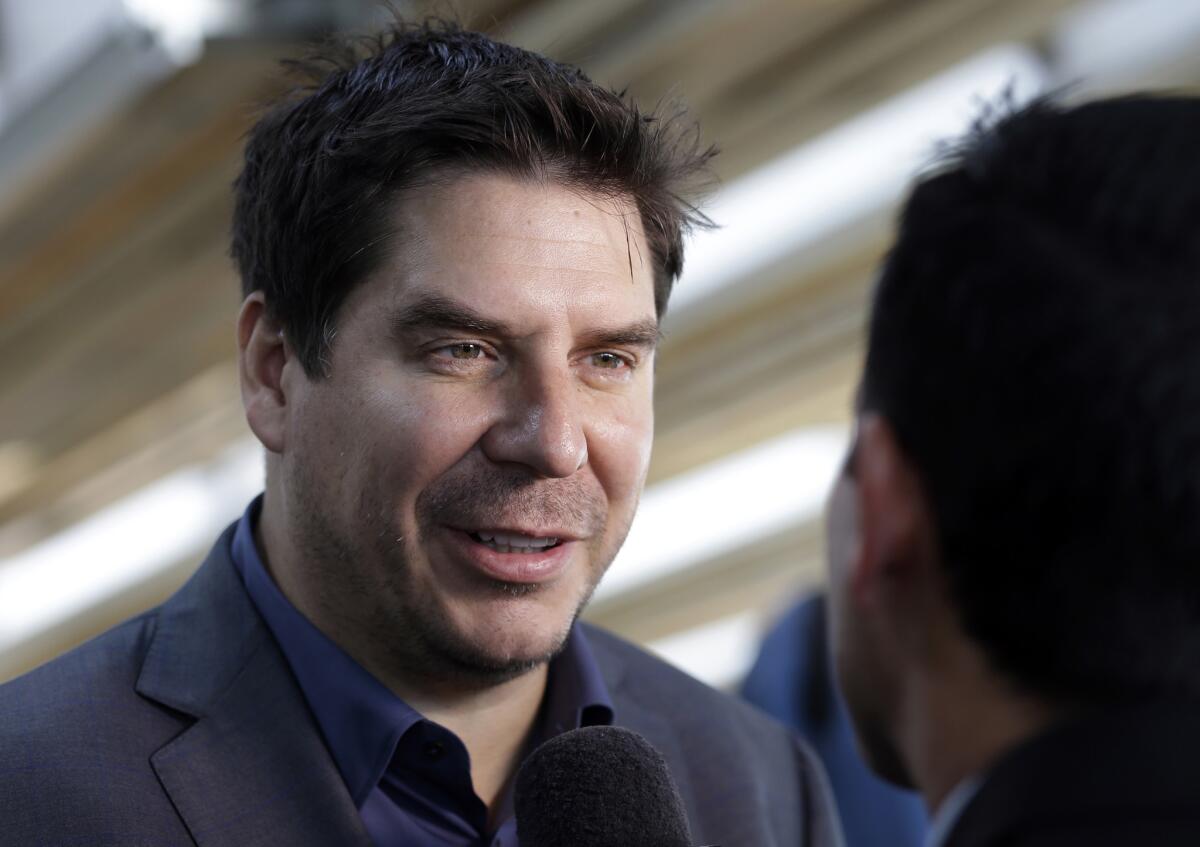SoftBank hopes new WeWork leader will be ‘guided missile’ to fix it

- Share via
When Marcelo Claure addressed WeWork’s staff in New York this week, he called his own emergence from Bolivia “one of those stories of something that’s not supposed to happen.”
Thought to be the Latin American country’s richest man, Claure is also the only Bolivian who has the ear of Japanese billionaire and SoftBank Chief Executive Masayoshi Son.
Five years ago, he took over the troubled U.S. telecom group Sprint at the behest of Son. Now he has been installed as executive chairman at WeWork parent We Co., the shared-office company into which SoftBank poured billions of dollars and which this week it was ignominiously forced to rescue from a looming bankruptcy.
By putting Claure in charge, Son has deployed a man described by associates as a ferociously energetic entrepreneur with a punishing work ethic and eye for detail.
“It’s kind of like launching a guided missile towards a problem,” said Michael Ronen, managing partner at SoftBank Investment Advisers.
The stakes could hardly be higher for SoftBank, where Claure is chief operating officer. This week’s $9.5-billion rescue is no guarantee that WeWork, whose founder Adam Neumann has now been sidelined, has a future. The rescue has brought SoftBank’s total commitment to WeWork to $18.5 billion, Claure told its staff this week.
At 6 feet 6, he is hard to miss. A father of six, Claure owns one soccer team and is developing another; he posts prolifically on Instagram and counts celebrities Jennifer Lopez and David Beckham as friends. The former England soccer captain has said of Claure that he is “lucky to have him as a friend and partner.”
Rod Millar, chief executive of Brightstar, the mobile phone reseller that Claure founded, said: “He’s probably the most charismatic person that I know.”
Born in 1970 in Guatemala, the son of a traveling geologist, Claure studied at Bentley University in Massachusetts. At the same time he set up an eclectic set of small businesses, including selling canned food and buying frequent flier miles from fellow students.
After university he landed a job at the Bolivian Football Federation thanks to a chance encounter on a flight with its president, and helped to take the South American nation to the World Cup for the first time since the 1950s. Another fortuitous meeting — this time with the disillusioned owner of a Massachusetts mobile phone store — saw him buy the store on credit and develop it into a chain.
It was in the unglamorous field of mobile phone distribution that the Bolivian made his fortune. He founded Brightstar in 1997, then sold a majority stake to SoftBank for $1.26 billion 16 years later. Ronen recalls him as “a very aggressive, hard-charging entrepreneur [but] incredibly organized.”
Rafael de Guzman, who worked as his chief of staff at Brightstar, recalled how Claure first met Son in Tokyo in 2012 and sought to convince Son of the benefits of buying back and then reselling customers’ old phones. “Immediately Son identified the competitive edge it would provide [in Japan]. A brief introductory meeting turned into a daylong session and a signed agreement.”
But there was a catch: The program, which would normally take months to establish, needed to launch in 10 days ahead of a new iPhone model. Claure made it happen.
He was brought into Sprint, where SoftBank took control in 2013 for $21.6 billion, after the mobile operator’s attempt to merge with rival T-Mobile failed. Claure slashed 4,000 jobs, replaced executives and cut prices. He and Son bought neighboring mansions near Kansas City, where WeWork was brought in to revamp Sprint’s headquarters.
In 2018 Sprint reported its first full-year profit in 11 years, and the merger with T-Mobile was revived, with the combination winning regulatory approval this month. Having relinquished the chief executive’s role at Sprint last year, Claure became chief operating officer at SoftBank and was given the unenviable challenge of making sure the group’s sprawling set of investments hit their financial targets.
A spell in Tokyo also exposed him to the power struggles at the top of SoftBank, where potential successors to Son are jostling for position. He has now returned to Miami, his long-term home and the city where he and Beckham are setting up a Major League Soccer team.
Claure “has put himself right in the middle of some of the more challenging corporate situations.... He’s someone who is well-known, trusted and in whom [SoftBank] rightfully [has] confidence,” said Stephen Scherr, chief financial officer at Goldman Sachs.
But reviving the fortunes of WeWork is not Claure’s only task. He remains executive chairman of Sprint, leads a new Latin American tech fund for SoftBank, and still chairs Brightstar and Fortress Investment Group. Luckily, he is known for his stamina; one associate said he has repeatedly sat in meetings with Claure at 3 a.m.
As at Sprint, Claure will lay off thousands of staff members. He will also have to oversee WeWork’s humiliating retreat from China, India and much of Latin America. He will use a familiar SoftBank strategy by ensuring the group’s companies send business WeWork’s way. The New York-based group will renovate all of SoftBank’s properties, he told staff this week.
But with a company whose losses ballooned as fast as its revenues, and a workforce fearful for their jobs and fuming at the colossal payoff granted to Neumann, many in the property industry are skeptical that WeWork has a future.
Claure is aware that most believe the odds are stacked against him. He reportedly told WeWork staff this week that “99% of advice that we got is to cut your losses and run away.”
Instead, he is digging in. “We’re betting [SoftBank’s] reputation and we’re betting everything we have.”
Additional reporting by Laura Noonan and Andrew Edgecliffe-Johnson.
© The Financial Times Ltd. 2019. All rights reserved. FT and Financial Times are trademarks of the Financial Times Ltd. Not to be redistributed, copied or modified in any way.
More to Read
Inside the business of entertainment
The Wide Shot brings you news, analysis and insights on everything from streaming wars to production — and what it all means for the future.
You may occasionally receive promotional content from the Los Angeles Times.










